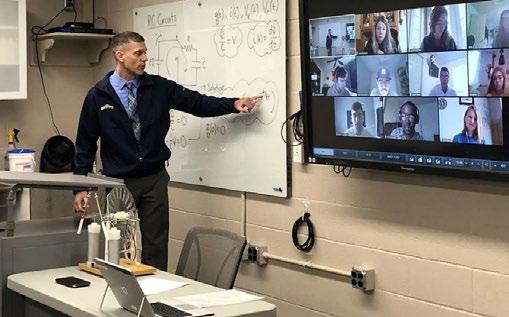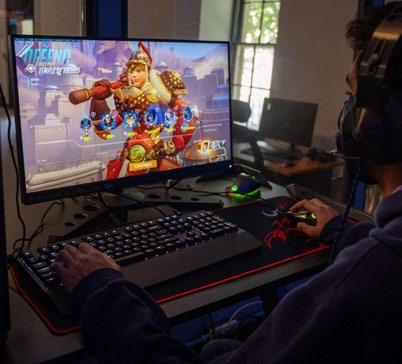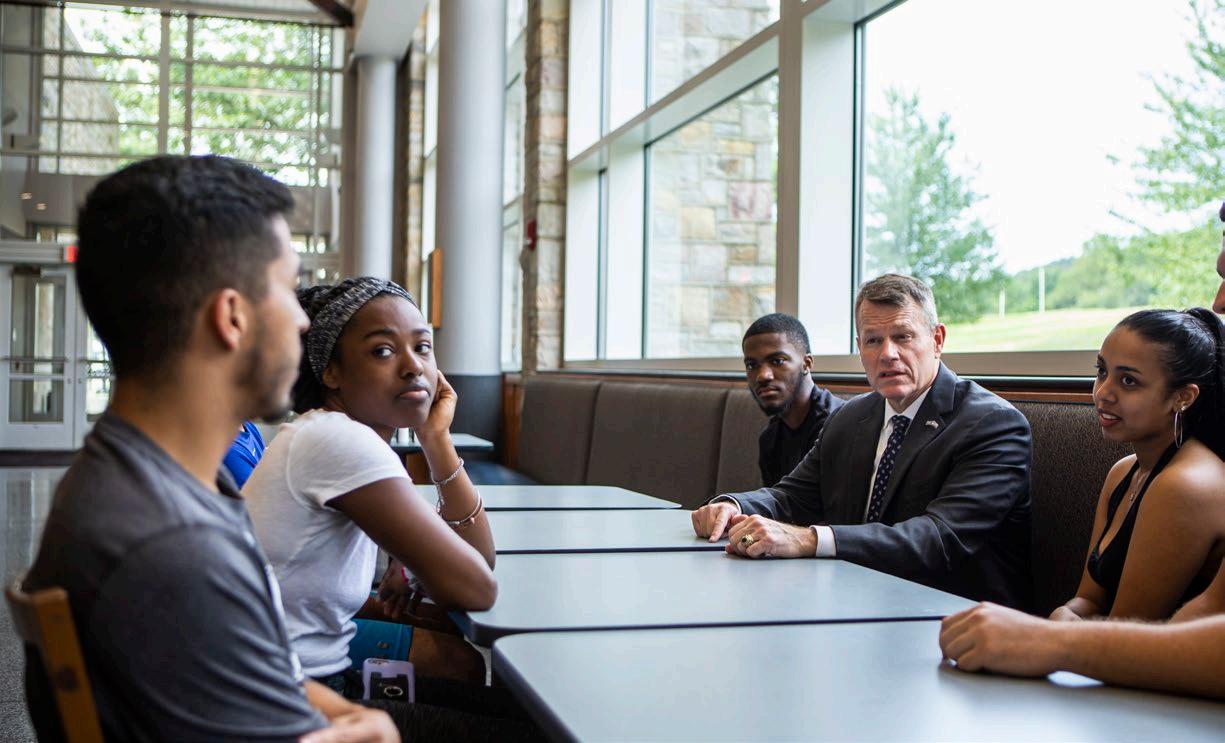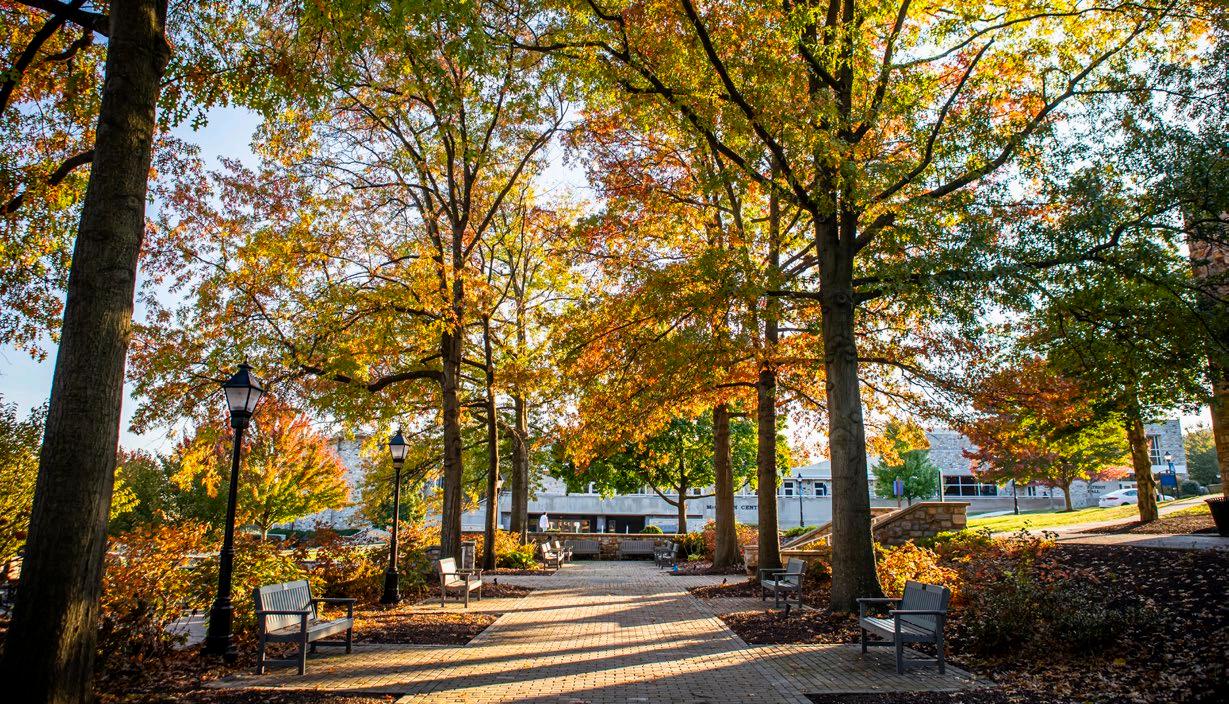
7 minute read
No Walls and New Tools: Higher Education in the Age of COVID-19
By Barbara A. Marinak, Ph.D., Dean, School of Education
PRIOR TO THE PANDEMIC, many educational futurists were warning higher education that “things needed to change.” We could not continue business as usual. These ominous discussions were based on many undeniable facts including shifting demographics resulting in fewer high school students heading to college, the demand for nontraditional majors such as interdisciplinary STEM degrees and the need to innovate graduate degrees. Wise universities, such as the Mount, paid careful attention to these data and began envisioning a very different future. And then, in two short months, our measured strategic planning was upended by the COVID-19 pandemic. Life on the other side of the pandemic appears to be taking two forms. Educational institutions (higher education and P-12 schools) are focused on either renewal or reimagining. Those with questionable and/or struggling futures appear to have an eye on renewal. Their efforts are locked on resuming activities after a pandemic interruption. Other institutions, including the Mount, are viewing the pandemic period as a time for reimagining how we can thrive in an era of no walls and new tools.
It sounds odd, but given our efforts prior to March 2020, the Mount was uniquely positioned for the pandemic. More important, thanks to the vision and leadership of President Trainor, we are reimagining higher education—at warp speed on some days! This reimagining means not being bound by classroom spaces and brick and mortar buildings. It requires rethinking teaching and learning in light of new tools and strategies. Mind you, none of us are happy about the conditions causing this transformation. But it does mean we have the opportunity to embrace important and exciting possibilities.
PRE-PANDEMIC: 2016-20
Prior to the pandemic, the Mount was beginning to reimagine how, where, when and to whom we delivered instruction. In order to be as flexible and student-centric as possible, we adopted Canvas, a next generation learning management system. Such a system is a digital platform whereby teaching and learning modalities are seamlessly blended and an ever-evolving collection of applications can be easily integrated. Canvas optimized functionality for students and faculty regardless of how they were teaching and allowed the university to roll out a wide variety of instructional tools such as digital conferencing and online discussions. However, as many observers of higher education note, the learning management system is not the final chapter in the evolution of the postsecondary digital learning environment; it is likely a prologue of things to come.
In addition to conducting a pilot and ultimately adopting Canvas, the Mount established a goal of strengthening relationships with Catholic high schools in the region. After a bit of investigation by the Center for Catholic School Excellence and its director Elizabeth Monahan, it became clear that many highly capable students in Catholic high schools are ready for postsecondary academic challenge during their junior and/or senior years. A logical initiative as a result of this need was to offer introductory-level Mount courses at our Frederick campus for students from local Catholic high schools such as St. John's Catholic Prep. The Frederick campus worked well for St. John's Prep but interest in the program quickly grew. Reimagining who we serve without walls and with new tools meant the Mount needed technology enabled, or Zoom, rooms. In 2018, two Zoom rooms were constructed—one on the main campus and one at the Frederick campus. The availability of Canvas and a Zoom room meant we could expand our outreach to Catholic high schools and welcome students from St. Maria Goretti in Hagerstown and Bishop Ireton in Alexandria, Virginia.
PANDEMIC: MARCH, 2020-PRESENT
Reimagining how we can thrive in an era of no walls and new tools took on new intensity when the Mount went remote in March 2020. Canvas provided a consistent repository for faculty to house course materials for remote learning. Having a bit of lead time that the pandemic might cause us to go totally remote, the Center for Instructional Design and Delivery (CIDD), under the leadership of Laura Frazier, Ed.D., quickly and easily integrated Zoom with Canvas. Having a powerful conferencing tool easily accessible in the learning management system facilitated ease of use for faculty teaching from home.

Kraig Sheetz, Ph.D. dean of the School of Natural Science & Mathematics
In addition to Zoom integrated with Canvas, some faculty preferred to deliver their courses from our Zoom rooms on the main campus and Frederick. Two classrooms were immediately available, and in 48 hours, Mount’s Information Technology Support Center (ITSC) built two additional portable Zoom classrooms. In these spaces, faculty could safely come to either the main campus or the Frederick campus to Zoom with their students from a classroom. The classroom allowed faculty to use chalkboards or whiteboards while they lectured and held discussions. Faculty teaching courses with intense computation, such as accounting and statistics, used the Zoom rooms throughout the remainder of the spring semester.
Understanding academic year 20-21 was to be like no other and recognizing the power of Zoom technology, President Trainor directed the Technology and Pedagogy Safe Team to make every classroom at the Mount “remote ready.” Over the summer, CIDD and ITSC partnered with Physical Plant to construct/assemble 42 Zoom rooms on the main campus, 11 at Frederick, and seven at the seminary. These Zoom rooms allow students who are fully remote this fall to participate in all classes. These instructional spaces have also ensured appropriate social distancing by grouping students in accordance with maximum classroom occupancies. In other words, large classes are divided into two groups with each group having a face-to-face and a remote day each week.
Lastly, Hansen's Sociology 320 course, Black Lives Matter, is an amazing example of no walls and new tools, and is likely a peek into our future post-pandemic. Hansen, an associate professor of sociology, is remoting into his courses from
Norway this fall. He has students taking the course on the main campus. In addition, Sister Ellen Marie Hager, principal from Elizabeth Seton High School (ESHS) in Washington, D.C., heard about the course and inquired. A Daughter of Charity high school, ESHS is committed to justice and equity. Sister Ellen Marie was interested in both her students and faculty enrolling. Currently five ESHS students and two faculty are studying with Hansen. Nineteen students in a variety of states in the U.S. and an instructor in Norway are wrestling with some of the most important and challenging questions of our time related to social justice, made possible because we are reimagining how, where, when and to whom we deliver instruction.
POST-PANDEMIC: HOPEFULLY SOON!
Post pandemic, a day that cannot come soon enough, the possibilities for the Mount are endless. Our reach is no longer limited by our geographic footprint. Undergraduate and graduate courses can now be delivered both face-to-face and remote in the same instructional space. We can deliver our signature high quality instruction in Canvas and Zoom either synchronously or asynchronously as we design programs to best meet the needs of a diverse student body. Student-athletes, students studying abroad, and students away from campus completing internships, to name a few, will always have access to their courses. And, consistent with the initiative that launched “no walls, new tools” pre-pandemic, the Mount will expand our outreach to Catholic high schools wherever they are. Thanks to visionary leadership during a pandemic, the Mount now has the expertise and tools to continue reimagining ways to, in Dr. Trainor’s words, “export our goodness!”
Megan Lipari Brown Religious Studies Department Chair Elizabeth Seton High School
Elise Howard, C’23 Elizabeth Seton High School
“It's tragic that learning about racism is nearly optional in college; if you don't actively seek it out as electives then you'll never learn it thoroughly. And white people who don't understand the past and present forces that hinder Black advancement risk looking at the obvious racial disparities we have today and thinking there's somehow something wrong with Black people rather than with what they've endured in America." - Kim P. Hansen, Ph.D., Associate Professor of Sociology










